Full Text of Human Rights Record of the United States in 2012
Updated: 2013-04-21 13:49
(Xinhua)
|
|||||||||
VI. On U.S. Violations of Human Rights against Other Nations
Since the end of the Cold War, the U.S. has waged wars on other countries most frequently. The wars in Iraq and Afghanistan, both started by the U.S., have caused massive civilian casualties. From 2001 to 2011, the U.S.-led "war on terror" killed between 14,000 and 110,000 per year, said an article posted on the website of Stop the War Coalition on June 14, 2012 (stopwar.org.uk, June 14, 2012). The UN Assistance Mission in Afghanistan (UNAMA) tallied at least 10,292 non-combatants killed from 2007 to July 2011. The Iraq Body Count project records approximately 115,000 civilians killed in the cross-fire from 2003 to August 2011. According to the article, beyond the two states under occupation, the "War on Terror" has spilled into a number of neighboring countries including Pakistan, Yemen and Somalia, killing a great many civilians there. From 2004 to the time the article was written, a minimum of 484 civilians, including 168 children, were killed in strikes that occurred in Pakistan. It was also reported by the media that strikes resulted in 56 civilian deaths in Yemen, the article added. A news report, posted on BBC's website on September 25, 2012, pointed at recurrent U.S. drone attacks in the border regions of Afghanistan and Pakistan (www.bbc.co.uk, September 25, 2012). "Just one in 50 victims of America's deadly drone strikes in Pakistan are terrorists - while the rest are innocent civilians," said an article posted on September 25, 2012, on the website of the Daily Mail (www.dailymail.co.uk, September 25, 2012).
U.S. soldiers in Afghanistan also kill civilians for no reason. U.S. soldier Robert Bales was reported to walk out of a military base in the southern province of Kandahar at 3 o'clock on the night of March 11, 2012 and killed 17 civilians, including nine children. Bales split the slaughter into two episodes, returning to his base after the first attack and later slipping away to kill again. He first came to one family in a nearby village and shot a man dead, which scared others in the family to hide in neighborhood. Then he went to a second family and shot dead three people and injured six. Afterwards, he returned to his base and left for another village after chatting with one soldier at the base. In the village, he broke into a family and shot dead more than 10 people who were sound asleep. After the massacre, he collected some of the bodies and burned them.( The Agence France-Presse, March 23, 2012; The Associated Press, March 24, 2012; The Huffington Post, November, 11, 2012)
U.S.-led military operations have also brought forth ecological disasters. An article posted on the website of The Independent on October 14, 2012 cited a study that reported a "staggering rise" in birth defects among Iraqi children conceived in the aftermath of the war (www.independent.co.uk, October 14, 2012). Steve Kretzmann, director of Oil Change International, said that the Iraq war was responsible for at least 141 million metric tons of carbon dioxide equivalent (MMTCO2e) from March 2003 through December 2007, according to a piece posted on December 21, 2009 on coto2.wordpress.com (coto2.wordpress.com, December 21, 2009). "The war emits more than 60 percent of all countries," said Kretzmann. A study, cited by an article posted on the website of The Independent on October 14, 2012, linked a huge rise that Iraq had recorded since the war in birth defects with military actions in which American forces used metal contaminant-releasing white phosphorus shells. It found that in the Iraqi city of Fallujah, which saw two of the heaviest battles during the Iraq war, more than half of all babies surveyed were born with a birth defect between 2007 and 2010. Before the war, the figure was more like one in 10. More than 45 percent of all pregnancies surveyed ended in miscarriage in the two years after 2004, up from the previous 10 percent (www.independent.co.uk, October 14, 2012).
U.S. soldiers have also severely insulted Afghan people's dignity and blasphemed against their religion. The AFP reported on September 24, 2012 that during a counter-insurgency operation in July 2011, four U.S. Marines urinated on three bloodied bodies of dead Taliban fighters, and one said, "Have a great day, buddy," to one of the dead. A videotape depicting their actions was recorded and later circulated on the Internet (The Agence France-Presse, September 24, 2012). In February 2012, U.S. troops at Bagram air base provoked public indignation by taking a batch of religious materials, including 500 copies of the Koran, to the incinerator, said a news story posted on the website of the Washington Post on August 27, 2012 (www.washingtonpost.com, August 27, 2012).
The U.S. army has for long detained foreigners illegally at the Guantanamo prison. By January 2012, 171 people were still held there, said an article posted on the website of Watching America on January 17, 2012. They were denied the rights accorded to prisoners of war under the Geneva Conventions, and savagely tortured (www.watchingamerica, January 17, 2012). American authorities have revealed that, in order to obtain confessions, some of the few being tried (only in military courts) have been tortured by waterboarding more than 100 times or intimidated with semiautomatic weapons, power drills or threats to sexually assault their mothers, said an article posted on the website of the New York Times on June 24, 2012 (www.nytimes.com, June 24, 2012). Media reported that in September 2012, a 32-year-old Yemeni named Adnan Farhan Abdul Latif died at the Guantanamo Bay detention camp, the ninth to have died there while in custody. He had been held at the detention camp since it was established in January 2002, without being charged with any crime (abcnews.go.com). On January 23, 2012, the United Nations High Commissioner for Human Rights Navi Pillay spoke out against the failure by the U.S. to close the Guantanamo Bay detention facility and to ensure accountability for serious violations - including torture - that took place there (www.un.org, January 23, 2012). A noted American wrote in an article that the American government's counterterrorism policies "are now clearly violating at least 10 of the declaration's 30 articles, including the prohibition against 'cruel, inhuman or degrading treatment or punishment'" (www.nytimes.com, June 24, 2012).
The U.S. refuses to acknowledge "the right to development," which is a common concern among the majority of countries. In September 2012, the 21st session of the United Nations Human Rights Council (HRC) adopted a resolution on "the right to development." Except an abstention vote from the U.S., all the HRC members voted for the resolution. The 67th session of the UN General Assembly overwhelmingly adopted the 21st consecutive resolution, by a recorded vote of 188 in favor to three against with two abstentions, calling for an end to the U.S.' 50-plus years of economic blockade against Cuba. One of the three dissenting votes was from the U.S. (United Nations document number GA/11311)
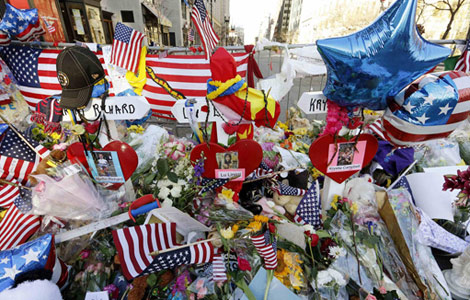
 Chinese victims' families arrive in Boston
Chinese victims' families arrive in Boston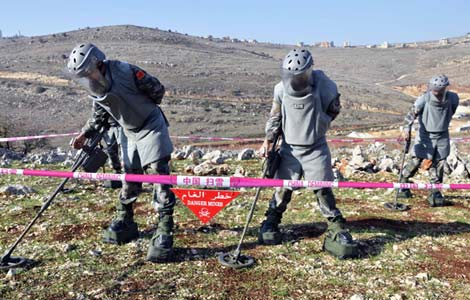
 Chinese soldiers clear mines, win hearts
Chinese soldiers clear mines, win hearts
 More bird flu patients discharged
More bird flu patients discharged
 Credibility still top concern for Chinese firms
Credibility still top concern for Chinese firms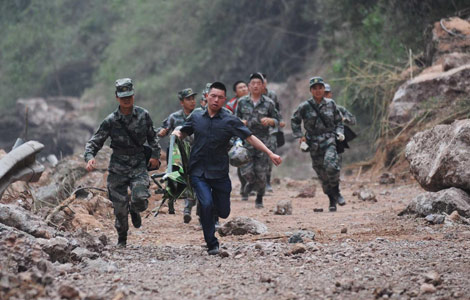
 Every second counts in rescue
Every second counts in rescue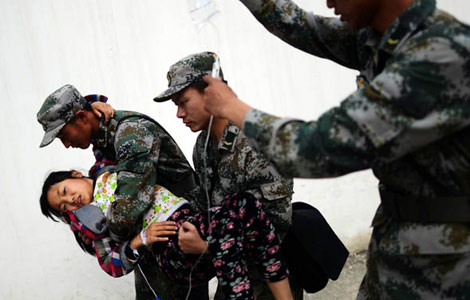
 Soldiers bring hope to earthquake-battered region
Soldiers bring hope to earthquake-battered region
 Premier visits quake-affected in hospital
Premier visits quake-affected in hospital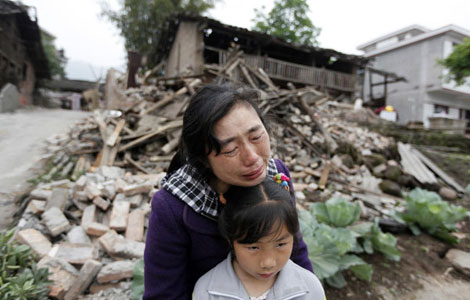
 Quake-affected people lose homes
Quake-affected people lose homes
Most Viewed
Editor's Picks

|

|

|

|

|

|
Today's Top News
Live report: 7.0-magnitude quake hits Sichuan
Chinese soldiers clear mines, win hearts
Intl scholarship puts China on the map
More bird flu patients discharged
County struggles to recover
Telecom workers restore links
Relief materials to reach quake zone
Govt: faster transfer for foreign quake aids
US Weekly

|

|







